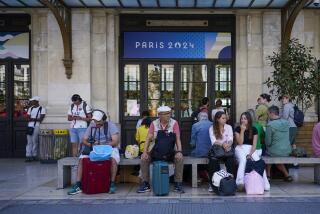Bomb Kills Cornered Madrid Suspects
- Share via
MADRID — At least three suspects in last month’s devastating railway bombings blew themselves up late Saturday as Spanish police closed in on them at a suburban apartment building. The explosion also killed one police officer and wounded 11.
Interior Minister Angel Acebes, in a late-night news conference, said at least three suspects were believed holed up in the apartment in Leganes, south of Madrid, when police closed in. When they realized that they were surrounded, the suspects began chanting in Arabic and shooting from their apartment, Acebes said.
Like most of the other suspects in the March 11 attacks, which left 191 people dead, they were believed to be Moroccans or North Africans.
It was not immediately known whether a Tunisian national believed to be the ringleader of last month’s attacks was among the dead.
But Acebes described the men pursued Saturday night as “authors” of the attacks, meaning that they could have been the people who deposited 10 backpacks in four commuter trains, set to detonate during rush hour. Or they could have been the planners.
“We have made a number of arrests in recent days,” Acebes said.
“We recently made known information about certain terrorists that we were seeking as the most involved in the March 11 attacks, and this was an investigation that was making significant progress.”
The raid was part of an ongoing manhunt for suspects in the train bombings -- the worst terrorist attack in Spanish history -- which have been blamed on the Moroccan Islamic Combatant Group. The group is believed to have ties to the Al Qaeda network.
Fourteen people have been arrested and charged in connection with the train bombings, which wounded 1,800 people.
Six alleged members of the group, including its purported leader, Tunisian national Sarhane Abdelmajid Fakhet, remain at large. Spanish authorities issued international arrest warrants for the six last week and said they believed the suspects probably had fled.
The urgency of rounding up all members of the presumed terrorist cell was emphasized Friday when another bomb was discovered on a high-speed rail line from Madrid to Seville. The explosive device could have killed or wounded hundreds of people, and its discovery threw the heavily used rail system into chaos on the eve of Holy Week.
The putty-like explosive substance found in that bomb was identical to that used in the March 11 attacks, Spanish authorities said.
Describing Saturday night’s operation, Acebes, the interior minister, said authorities evacuated residents from three apartment buildings, cordoned off the area and dispatched helicopters to the scene.
As police neared, the suspects detonated a large bomb, Acebes said.
The explosion caved in the apartment’s ceiling, creating so much debris that it was difficult to determine whether three or four suspects had been killed, he said. It is possible that three men were killed and a fourth escaped, he said.
“We think three terrorists may have sacrificed themselves, but there may be more,” Acebes said.
The massive explosion drew two dozen ambulances, a huge security deployment and sent new shock waves to a Spanish people already grappling with whether it’s safe to go out in public.
The ruling party fell in elections three days after the train bombings, in part because of voter anger over the attack and the government’s handling of the investigation.
The Spanish government was an enthusiastic supporter of the U.S.-led war in Iraq, despite widespread public opposition. Al Qaeda operatives have repeatedly threatened to punish U.S. allies.
More to Read
Sign up for Essential California
The most important California stories and recommendations in your inbox every morning.
You may occasionally receive promotional content from the Los Angeles Times.













